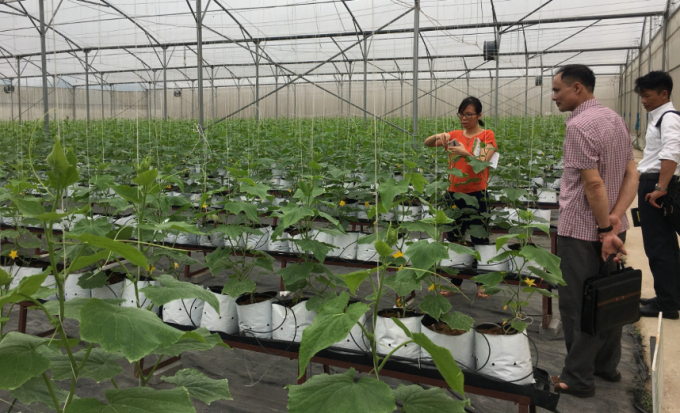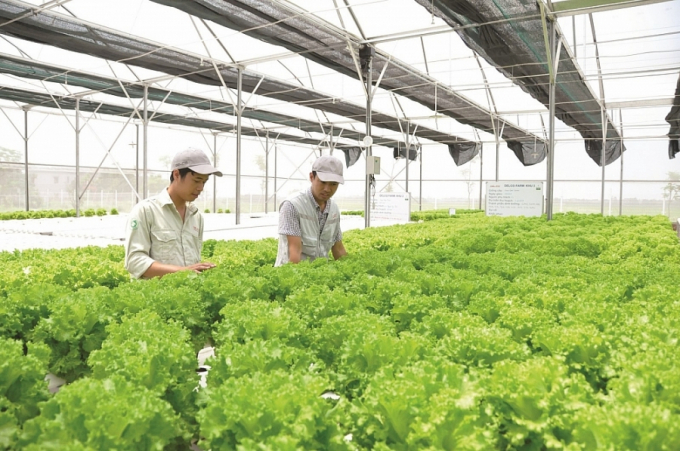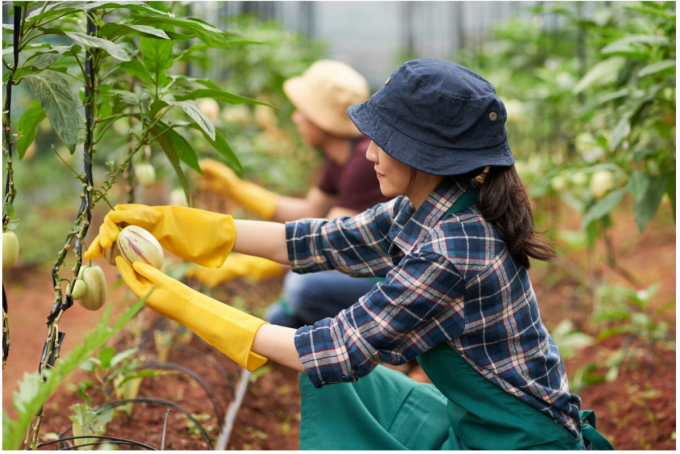November 28, 2025 | 05:06 GMT +7
November 28, 2025 | 05:06 GMT +7
Hotline: 0913.378.918
November 28, 2025 | 05:06 GMT +7
Hotline: 0913.378.918
ing

Project team of experts during a visit to a clean vegetable processing facility in Yen Dung district, Bac Giang. Photo: TL.
EVFTA is one of the new-generation Free Trade Agreements that brings Vietnam many opportunities, but at the same time a series of challenges related to sustainable development, labor standards, climate change and biodiversity are also included in the agreements.
Among them, “eco-fair” is the one aspect that has specific binding terms. This is a combined standard of “eco” production and “fair” trade. Eco-production goes in line with requirements of sustainability of the envỉonment, product life cycle and efficient use of natural resources. Fair trade is about respecting gender equality, the needs of disabled people, the rights of minorities and indigenous peoples, and fair payments.
The "Promoting supply and demand for eco-fair certified agro-products in Vietnam" Project (the Eco-Fair Project) is introduced as a way to help Vietnamese businesses, especially small and medium-sized enterprises (SMEs), have faster access to “eco-fair” standards. The Eco-Fair Project is sponsored by the European Union (EU) and implemented in collaboration with the Vietnam Rural Industries Research and Development Institute (VIRI), Center for Creativity and Sustainability Study and Consultancy (CCS), and Vietnam Cleaner Production Centre (VNCPC).
Mr. Koen Duchateau, Head of Cooperation, First Counselor, Delegation of the European Union to Vietnam, said: “The Eco-Fair Project offers an opportunity for Vietnam to move towards more sustainable agriculture and achieve the goal of transitioning to more sustainable production and consumption by engaging value chain stakeholders, including the private sector, consumer groups and policy makers.”

The Eco-Fair project offers an opportunity for Vietnamese agriculture to move towards sustainable development.
The Eco-Fair Project sets many goals in the Vietnam action plan: at least 1,000 enterprises receive training on mobile applications; 200 enterprises receive evaluation and technology transfer on Resource Efficient and Cleaner Production (RECP); 200 "eco - fair" products are commercialized.
During the implementation period, selected businesses will receive many supports, from access to green finance, development of new products and clean technology to Eco-Fair certification. One thing to note is that the ultimate beneficiaries of the project - consumers - will thus be raised awareness and support for sustainable consumption.
"We expect approximately 500,000 consumers to enjoy the fruits of the Eco-Fair Project," said Mr. Duchateau.
The founders of the Eco-Fair Project want to spark inspiration of sustainable values towards society and the environment through the implementation of activities such as raising awareness and capacity of the business community as well as consumers. Our solution is to develop codes of conduct on sustainable production and consumption in the industry, establish a network to advocate for the government's sustainable production and consumption policies to support these goals.
Dr. Nguyen Bao Thoa, Director of VIRI

“Ecological agriculture” is one of the goals of the agriculture sector, next to “modern countryside” and “smart farmers”.
On March 11, a webinar on “Supporting agricultural production and trading enterprises to enhance sustainable production capacity” of the Eco-Fair Project was held, attracting the attention of nearly 200 businesses.
In addition to developing production, sales, marketing and distribution systems, participating enterprises also expressed their wish to have more access to green financial sources.
"Green finance" is a term that describes an increase in financial flows (banking, microcredit, insurance and investment) from the public, private and non-profit sectors to sustainable development priorities. This is something that businesses can achieve if there are plans and roadmaps for sustainable development, such as building a thorough ecological agriculture system. However, this is still limited in Vietnam.
Mr. Nguyen Xuan Truong, director of a company specializing in producing water purifiers in Kien Giang, mentioned the difficulty in getting loans compared to larger enterprises at the webinar. Through the workshop, he believed he had found the answer he was looking for. “The step my company needs to take is the transition towards Resource Efficient and Cleaner Production (RECP). I will promptly devise a plan to have my products certified as sustainable.”
Having received free training on ecological agricultural production, Mr. Truong's company and hundreds and thousands of other partners realized three main problems that need to be improved in the production process: the first is post-harvest technology, including sorting, preserving and processing vegetables, tubers and fruits; the second is the limited number of deep processing enterprises nationwide; the third is the packaging specifications unable to catch up with the world’s general trend.
Thanks to the consultation of the Eco-Fair Project’s experts, Mr. Truong believes that enterprises need to act soon so that their product can meet “eco-fair” standards.
Translated by Samuel Pham

(VAN) According to Mr. Vo Minh Thanh, Director of the Tay Ninh Department of Agriculture and Environment, Resolution 57 has created a new development pathway for the locality, shifting from traditional toward modern agriculture.
/2025/11/26/4909-2-154329_878.jpg)
(VAN) Pearl grouper farming in HDPE cages not only delivers economic efficiency but also contributes to protecting the environment, creating jobs, and promoting marine-based experiential tourism.

(VAN) The model of making a living under the forest canopy through the agroforestry system in Van Son commune, Bac Ninh province, is expected to generate an annual income of approximately VND 30 million/ha.

(VAN) Many enterprises in Can Tho are harnessing natural energy and reducing greenhouse gas emissions in their production processes, thereby contributing to the promotion of a sustainable green transition.
/2025/11/24/3536-2-112800_176.jpg)
(VAN) Dong Nai now has tens of thousands of hectares of forests certified for sustainable management, and this area will continue to be expanded in the coming period.

(VAN) Vinh Ha hamlet (Dai Xuyen commune, Hanoi) is shifting away from small-scale farming as households adopt bioscurity into their breeder chicken models.

(VAN) Heavy rains make aquatic species more vulnerable to disease. Proactive water management and high-tech systems help farmers prevent outbreaks and protect yields.